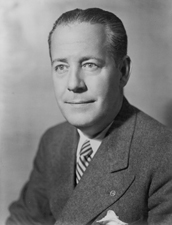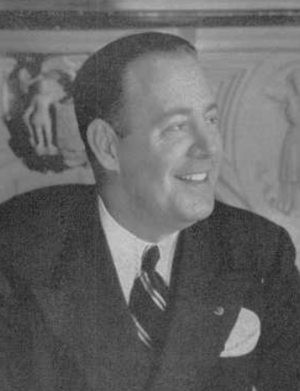Herbert O'Conor facts for kids
Quick facts for kids
Herbert O'Conor
|
|
|---|---|
 |
|
| United States Senator from Maryland |
|
| In office January 3, 1947 – January 3, 1953 |
|
| Preceded by | George L. P. Radcliffe |
| Succeeded by | James Glenn Beall |
| Chair of the National Governors Association | |
| In office June 21, 1942 – June 20, 1943 |
|
| Preceded by | Harold Stassen |
| Succeeded by | Leverett Saltonstall |
| 51st Governor of Maryland | |
| In office January 11, 1939 – January 3, 1947 |
|
| Preceded by | Harry Nice |
| Succeeded by | William Preston Lane Jr. |
| Attorney General of Maryland | |
| In office January 9, 1935 – January 11, 1939 |
|
| Governor | Harry Nice |
| Preceded by | William Preston Lane Jr. |
| Succeeded by | William C. Walsh |
| Personal details | |
| Born |
Herbert Romulus O'Conor
November 17, 1896 Baltimore, Maryland, U.S. |
| Died | March 4, 1960 (aged 63) Baltimore, Maryland, U.S. |
| Political party | Democratic |
| Spouse |
Eugenia Byrnes
(m. 1920) |
| Children | 5 |
| Education | Loyola University, Maryland (BA) University of Maryland, Baltimore (LLB) |
| Military service | |
| Allegiance | |
| Branch/service | |
| Unit | United States Naval Reserve |
| Battles/wars | World War I |
Herbert Romulus O'Conor (born November 17, 1896 – died March 4, 1960) was an important American lawyer and politician from Maryland. He served as the 51st Governor of Maryland from 1939 to 1947. After that, he became a United States Senator, representing Maryland from 1947 to 1953. He was a member of the Democratic Party.
Contents
Early Life and Education
Herbert O'Conor was born in Baltimore, Maryland. His parents were James P. A. O'Conor and Mary Ann (Galvin) O'Conor. He went to Loyola College and earned his Bachelor of Arts degree. Later, he graduated from the University of Maryland School of Law in 1920. While he was studying, O'Conor also worked as a reporter for the Baltimore Sun newspapers from 1919 to 1920.
In 1920, Herbert O'Conor married Mary Eugenia Byrnes. They had five children together: Herbert Jr., Eugene, James, Robert, and Mary Patricia.
Early Career in Law
After finishing law school, O'Conor began his career in public service. From 1921 to 1922, he worked as an assistant state's attorney for Baltimore. In 1923, he was elected as the State's Attorney for Baltimore City. He held this position until 1934.
In 1934, O'Conor was elected as the Attorney General of Maryland. He served in this role until 1939. During his time as Attorney General, he also served in the National Association of Attorneys General in 1937.
Governor of Maryland
In 1938, Herbert O'Conor was elected as the Governor of Maryland. He won against the Republican governor, Harry W. Nice. When he became governor, O'Conor made history as the first Roman Catholic of Irish descent to hold that office in Maryland.
As governor, O'Conor focused on several important areas:
- He created the Maryland Council of Defense during World War II. This group helped the state prepare for and respond to the war.
- He worked to make the state's transportation system better. This included planning new bridges over the Susquehanna River and Potomac River.
- He also worked with other states to encourage cooperation. He served as Chairman of the Governor's Conference in 1941 and President of the Council of State Government in 1943.
Near the end of World War II, O'Conor started the Commission on Post War Reconstruction and Development. This group helped plan how Maryland would recover and grow after the war. He also worked to improve healthcare in the state.
United States Senator
In 1946, O'Conor was elected to the United States Senate. He represented Maryland in the Senate from 1947 to 1953. In the Senate, he was the chairman of a special committee. This committee looked into organized crime that crossed state lines. He decided not to run for re-election in 1952.
After his time in the Senate, Herbert O'Conor continued to practice law. He worked in Baltimore and Washington, D.C. He passed away in Baltimore in 1960 and is buried in New Cathedral Cemetery.
Building Dedications
- The Herbert R. O'Conor State Building in Baltimore, Maryland, is named in his honor. This building was part of an early urban development project.


